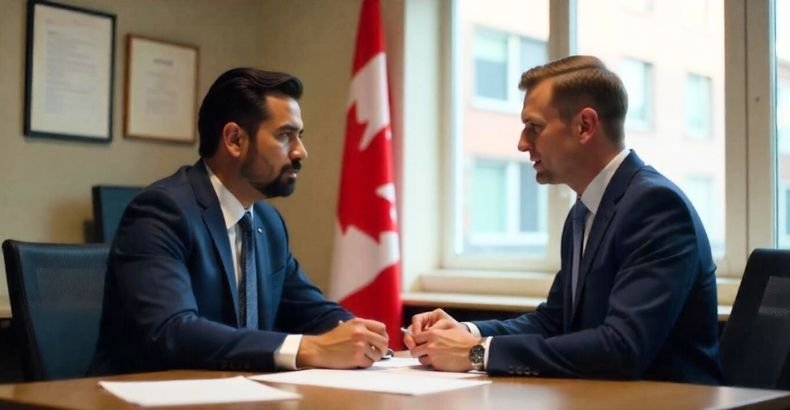If you plan to attend a conference in Canada, you may need to apply for a Canada conference visa. This visa is designed for individuals attending professional or academic events such as seminars, workshops, or conferences. As you prepare for your trip, you might be wondering, “How many months is a Canada conference visa?”
In most cases, the visa is issued for the duration of the event itself. However, if you need to stay for additional meetings, workshops, or other business activities, the visa may be extended for up to six months. The key factor in determining the length is your provided documentation and the visa officer’s assessment.
Are you curious about what factors influence the length of your visa or how to ensure your application is processed smoothly? Keep reading to find all the details you need to know about the Canada conference visa and its requirements.
Do You Need a Visa to Attend a Conference in Canada?
Depending on your nationality, you may need a visa to attend a conference in Canada. Citizens of some countries are exempt from needing a visa for short visits, while others must apply for a Temporary Resident Visa (TRV) to enter Canada.

If you do require a visa, you will need to apply for a Canada conference visa. This type of visa is designed for individuals who are attending professional or academic events such as conferences, seminars, or workshops. The visa will be issued for the duration of the conference.
To apply, you will need an official invitation letter from the conference organizers, proof of financial support, and other required documents. It’s important to submit your application well in advance to ensure timely processing and avoid any issues before the event.
How Many Months is a Canada Conference Visa?
Visas for Canada conferences are typically granted for a period of time, based on the duration of the event. In most cases, the visa will be issued for the duration of the conference itself. For example, if the conference is scheduled for one week, your visa will usually cover that time frame.

In some cases, if you plan to stay in Canada for additional meetings, workshops, or business activities after the conference, you may be granted a visa for a longer duration—up to six months. The key factor here is providing sufficient justification for the extended stay, which can include documentation of other related events, meetings, or academic commitments.
Factors That Affect Its Duration of Canada Conference Visa
The duration of your visa is primarily determined by the nature of your visit, the details provided in your application, and the assessment of the visa officer reviewing your case. Here are the key factors that affect the length of a Canada conference visa.
Conference Dates and Duration
The most direct factor influencing the duration of your Canada conference visa is the length of the conference itself. If the conference lasts for only a few days, your visa will generally be issued for that duration. However, if you intend to participate in additional workshops, sessions, or meetings related to the event, the visa officer may extend your stay accordingly.
Visa Officer’s Discretion
Visa officers have the discretion to grant a visa for a duration that they feel is appropriate, based on the information provided in your application. They will assess whether you have a valid reason to stay beyond the dates of the conference. If they believe you may overstay your visa or that your intentions are unclear, they might issue a visa for a shorter period.
Supporting Documents
The documents you submit with your visa application play a significant role in determining how long your conference visa will be valid. If your invitation letter from the conference organizers specifies that your participation will last for a certain period, the visa officer will usually issue the visa to match those dates.
Previous Travel History
Your previous travel history, including past visits to Canada or other countries, can also impact the duration of your visa. If you have a record of returning to your home country after your visa expires, the officer may feel confident in issuing a longer visa.
On the other hand, if you have overstayed a visa in the past or have a history of not adhering to visa conditions, the officer might issue a shorter visa or request additional documentation to support your application.
Type of Visa You Apply For
The type of visa you apply for can also affect the duration. A Temporary Resident Visa (TRV) for a conference will typically be issued for the length of the event, but if you are applying for a multiple-entry visa, the duration might be longer. Multiple-entry visas allow you to re-enter Canada multiple times within a certain period, which might result in a longer visa validity.
Your Purpose for Attending the Conference
Another factor that can influence the duration of your conference visa is the clarity of your purpose for attending the event. If you can demonstrate that your trip is solely for the conference and that you do not intend to stay beyond the event’s duration, the officer may be more likely to approve a visa for the exact period of the conference.
What Are the Requirements for a Canada Conference Visa?
If you are planning to attend a conference in Canada, you will need to apply for a conference visa. The Canada conference visa application process involves specific requirements and steps to ensure that your visa application is successful. Below is a breakdown of the key requirements for a Canada conference visa.
Invitation Letter from the Conference Organizers
One of the most important documents you will need to submit is an official invitation letter from the conference organizers. This letter should outline the details of the event, such as the dates, location, and purpose of the conference. It should also include information about your role in the event, whether you are attending, presenting, or speaking.
Proof of Financial Support
Another key requirement is proof that you have sufficient funds to cover your stay in Canada. This can include recent bank statements, pay slips, or a letter from your employer confirming that they will cover your expenses. The amount you need to show will depend on the length of your stay and your expected costs for accommodation, travel, and other expenses.
Travel Itinerary
You will also need to submit a travel itinerary outlining your arrival and departure dates, as well as any internal travel within Canada (if applicable). This helps to demonstrate that your trip is well-planned and that you will be leaving Canada once the conference is over. Itinerary details can include flight bookings, accommodation reservations, and plans for any post-conference activities.
Valid Passport
Your passport must be valid for at least six months beyond the dates of your planned stay in Canada. It must contain at least one blank page for the visa stamp. You should also submit a copy of the passport’s information page along with your visa application.
Evidence of Ties to Your Home Country
To show that you will return home after the conference, you will need to provide evidence of your ties to your home country. This could include a letter from your employer stating that you are on temporary leave, evidence of property ownership, or family commitments.
Medical Insurance
While not always required, medical insurance can be an important factor in your application. If you are planning to stay in Canada for an extended period, having travel medical insurance that covers you for the duration of your stay is a good idea. Some provinces may require proof of insurance for certain types of visas.
Canada Conference Visa Cost
The cost of a Canada conference visa can vary based on several factors, such as the type of visa, the duration of stay, and the applicant’s nationality. Typically, the fee for a temporary resident visa (TRV) to attend a conference in Canada is around CAD 100. This is a standard processing fee, and it must be paid when you submit your visa application.
Additional Costs to Consider
While the application fee is fixed, there may be additional costs involved in the visa process. These may include:
- Biometrics Fee: Depending on your nationality, you may need to submit biometrics (fingerprints and a photograph) as part of the visa application process. This usually costs CAD 85 for individuals or CAD 170 for families applying together.
- Medical Exam Fees: Some applicants may be required to undergo a medical exam, particularly if they plan to stay in Canada for an extended period or if they are from a country with high health risks. The cost of the medical exam can vary, but it typically ranges from CAD 100 to CAD 300.
- Visa Processing Fee for Extensions: If you plan to extend your Canada conference visa, there will be an additional processing fee, which is generally around CAD 100.
- Travel and Accommodation Costs: In addition to the visa fee, you will need to budget for your travel to Canada and accommodation during the conference. While these are not directly related to the visa, they are essential to your trip’s cost.
When applying for a Canada conference visa, it’s important to consider not just the visa application fee but also additional expenses. Understanding the cost of a Canada conference visa will help you budget for the overall trip, including biometric fees, potential medical exams, and visa extensions.
Payment Methods
Visa application fees can be paid online or at a Visa Application Centre (VAC), depending on your location. Payment is usually made through a credit card, debit card, or other accepted methods, depending on the embassy or consulate’s guidelines.
How to Apply for a Canada Conference Visa?
Applying for a Canada conference visa involves several steps that require careful preparation. Here is a breakdown of the application process:
Step 1: Prepare Your Documents
Before applying for a conference visa, ensure you have all the required documents. The conference invitation letter for visa applications is a key component, but you will also need to provide other documents such as proof of financial support, a travel itinerary, a valid passport, and evidence of ties to your home country. Make sure all documents are up-to-date and complete before submission.
Step 2: Complete the Visa Application Form
The next step is to complete the visa application form (IMM 5257). This form asks for basic personal details, travel information, and the purpose of your visit to Canada. It’s crucial to fill out the form accurately and truthfully. Any inconsistencies or errors can lead to delays or a rejected application.
Step 3: Pay the Application Fee
Once your form is complete, you will need to pay the application fee. This fee is typically CAD 100, but it may vary depending on your nationality. Payment can usually be made online through the official Immigration, Refugees, and Citizenship Canada (IRCC) website.
Step 4: Submit Your Biometrics
Depending on your nationality, you may be required to submit your biometrics (fingerprints and photographs). You will be instructed on how and where to submit your biometrics once you submit your application.
Step 5: Attend an Interview (if required)
In some cases, you may be asked to attend an interview at the Canadian consulate or embassy. The purpose of the interview is to assess your intentions for visiting Canada and ensure that you meet the requirements for a temporary resident visa.
Step 6: Wait for the Visa Decision
After submitting your application and biometrics, the final step is waiting for the decision. The processing time for a Canada conference visa typically takes around 10–15 business days. However, it may take longer depending on the volume of applications or if additional documentation is requested.
How Do I Extend My Canada Conference Visa if Needed?
If your conference is extended, or if you want to stay longer in Canada for personal reasons, you may need to apply for an extension of your Canada conference visa. The process for extending your visa is fairly straightforward, but it’s important to follow the correct steps and apply before your current visa expires.

Step 1: Verify Eligibility
Before applying for an extension, check if you are eligible to extend your Canada conference visa. If you have complied with all the terms of your visa and your conference participation is still ongoing, or if you need extra time for professional networking or other related activities, you can apply for an extension.
Step 2: Gather Documents
To apply for an extension, you will need to provide supporting documents, including your current visa, proof of conference extension or continuation, proof of financial support, and a letter explaining why you need the extension. These documents help demonstrate that you are still attending the conference or involved in other professional activities.
Step 3: Submit the Application
You can apply for an extension online through the official Canadian immigration website. Ensure that you submit your extension request well in advance of your visa’s expiration date to avoid overstaying your permitted stay. If you prefer, you can submit a paper application at a Visa Application Centre (VAC).
Step 4: Pay the Extension Fee
There is a fee for extending your visa, typically around CAD 100. Ensure that you pay the correct fee and keep the receipt for your records. Be aware that additional fees may apply if you need to provide biometrics.
Step 5: Wait for the Decision
Once you have submitted your extension application, the processing time can take several weeks. You can track the status of your application online. If your extension is approved, you will receive a visitor record that allows you to stay in Canada for the new duration.
Frequently Asked Questions
Below are five additional questions and answers regarding the Canada conference visa. These answers aim to address common concerns and provide clarity for those planning to attend conferences in Canada.
Can I Attend Multiple Conferences on One Canada Conference Visa?
Yes, you can attend multiple conferences on a Canada conference visa, as long as they occur within the duration of your approved visa. You will need to provide documentation for each conference, such as invitation letters and an updated itinerary, to confirm your attendance at multiple events.
How Long Before My Conference Should I Apply for a Canada Conference Visa?
It is advisable to apply for your Canada conference visa at least 2-3 months before the start of the conference. This gives enough time for processing and allows for any unforeseen delays, such as additional documentation or biometric appointments.
Can I Change the Dates of My Canada Conference Visa After Approval?
Once your Canada conference visa is approved, changing the dates can be difficult. If you need to adjust your travel dates or extend your stay due to changes in the conference schedule, you must apply for a visa extension or a new visa with the updated dates.
Is a Canada Conference Visa Different From a Tourist Visa?
Yes, a Canada conference visa is different from a tourist visa. A conference visa is issued specifically for individuals attending professional or academic events, while a tourist visa is for general travel purposes.
Do I Need a Letter of Invitation for a Canada Conference Visa?
Yes, a Canada conference visa application requires an official invitation letter from the conference organizers. This letter should confirm your participation, the event details, and your role, whether you are attending, presenting, or speaking.
Final Thought
Getting a Canada conference visa is an important step for those planning to attend professional or academic events in Canada. It allows you to travel legally and participate in valuable networking and learning opportunities. With proper documentation and preparation, you can ensure a smooth application process.
If you’re wondering, “How many months is a Canada conference visa?” The duration of the visa generally matches the length of the event you’re attending. In most cases, the visa will be issued for the duration of the conference. If necessary, you can apply for an extension for up to six months.

Leave a Reply